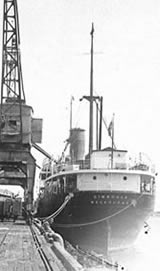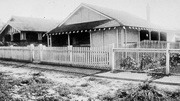

Attends 'Au Revoir' on leaving for a holiday in the Eastern States.
'"Au Revoir" to Mr Curtin. Directors and Staff Assemble to do Him Honor.
We have had our dark days, but they are behind us. The future is bright with promise, and I am satisfied that Labor is about to rise to greater heights than it ever before attained.
This was the inspirational utterance of Mr J. Curtin, editor of the Worker, delivered at a function in the Worker office last week-end, when the staff said "Au revoir" to him. (Mr Curtin was due to leave on Saturday for a holiday in the Eastern States.)
Mr Curtin said he came to the West in 1917 to take over the editorship of the Worker, and the six years which had passed had been a time of great trial. Labor had been fighting with its back to the wall. In that fight the Worker had played no mean part. Now that the worst was over, he thought the staff could look back on the struggle with satisfaction. For his own part he could say that his association with Labor in WA had been most pleasurable. He had not thought this way when they were all in the thick of it; but recent occurrences had made him a happy man. (Applause) Something told him that big things would happen soon. The Worker would expand. Before long it would possess a complete plant, capable of meeting all the requirements of the times. It already possessed an efficient staff, and the members of that staff worked year in and year out in perfect concord and harmony. Adequate publicity was one of Labor's greatest needs; when it had a press of its own it would be invincible. He hoped to acquire fresh knowledge and improved health and strength during his holiday, so as to fit him better for the glorious days that were at hand. (Applause)
Eulogistic references were made to Mr Curtin's editorship by Mr J B Holman (Chairman of Directors, Mr D Watson (Manager), and Mr H Millington (Secretary of the ALP, and a Director of the Worker). Mr Holman said the editor had been a tower of strength to them and had rendered invaluable service. Mr Watson said they were all elated at "the turn of the tide": in his opinion the "turn" in Western Australia had been helped forward very considerably by three men – Messrs Collier, Curtin, and Millington. Mr Millington said they felt happy because they were saying "Au revoir"; if it were "Goodbye" the occasion would be one for sadness instead of gladness.
The toast "Mr and Mrs Curtin" was then honored to the accompaniment of "For They Are Jolly Good Fellows." Vic Johnson, who was present, at this stage said "What about a verse?" and the singing of "Solidarity" brought the function to a close.'2

SS Dimboola mid 1920's.
Courtesy Fremantle City Library Local History Collection. Photo No.1664. Photographer Arthur Saxon.
Attends annual council of the Australian Journalists' Association.
At this conference Curtin’s 'quiet campaign' to politicise the AJA resulted in him moving successfully for the AJA to participate in a conference at the Melbourne Trades hall designed to establish a Commonwealth Council of Trade Unions.
'One delegate reported that the meeting of the AJA council was marked by a "grim determination to preserve, inculcate, and intensify the unionistic spirit"’ as the eleven representatives sat around a table in a small room at the back of the Sydney Press Club. Even with the windows thrown open, and their shirt sleeves rolled up, they still sweltered in the summer heat as they sipped at their iced water and sought for common ground. With his cigarette butts mounting in front of him, Curtin was instrumental in the council reaching agreement.'4
JCPML. Records of the Curtin Family. Curtin house, 14 (later re-numbered 24) Jarrad Street, Cottesloe, c1927. JCPML00382/33
8 pm
Takes part in ALP Basic Wage deputation to Premier.
'At the Basic Wage deputation to the Premier on Monday the ALP was represented by Messrs H Millington, E H Barker, Chas Haynes, J W Hogarth, T C Butler, A J Watts, J J Kenneally, and J Curtin.'8
Speaks at the farewell of Mr F M Kelsall who taking a holiday from the Westralian Worker.
'Prior to his departure on a holiday visit to Great Britain, Mr F M Kelsall was accorded the thanks of the directors and staff of this paper for the invaluable services and comradeship he has rendered the Labor Press and his workmates ever since the inception of the business.
Mr Kelsall was the first Chairman of Directors, and has been associated with the company throughout its existence either as a director, contributor, or employee. A handsome travelling rug was handed to the traveller by Mr A J Watts (vice-chairman), and appreciative speeches were delivered by Messrs J W Hickey, MLC, S B Nielson, D Watson, and J Curtin. In his reply Mr Kelsall paid a tribute to Mr J D Taylor for the support and assistance "Doug" has given year in and year out to the Worker and the Printers' Union.'10
Sunday afternoon
14 October
Sunday evening 28 October
Delivers the fourth of the series of lectures being conducted in Perth by the Theosophical Society under its three months' 'Brotherhood Campaign' the subject being that of 'World Peace.'
'The lecturer treated the subject in a broad and comprehensive manner. The day of "war" was not yet over, but, he said, the terrible suffering which always came about as a result of conflict, whether international or civic – a suffering not only of the actual combatants themselves but also of the innocent and peaceful citizens, women and children – was slowly teaching the individual the futility of warfare…
Most of us were, at heart, peaceful, and in our sober moments realise the horrors and futility of war, but when the dogs of war were unleashed … the vast majority of people lost their balance, and the "Old Adam", lying dormant, would rise and drive us on to deeds of bloodthirstiness, of which we, in our sober moments, would be ashamed. The lust of war spread like a devastating fire, fanned by what was often wrongly called "patriotism," and the before time lover of peace would turn and deride fiercely those who had not been so completely carried away as to cry war in defiance of their better judgment...
We had yet to realise that one cannot annihilate any one family without suffering a grievous reaction. We had yet to fully realise the great interdependence of all the families of the world, great and small. That realisation was slowly coming. Today the feeling of brotherliness was gradually spreading outside the immediate family circle. One did not go round attacking one's fellow citizens, and depriving him of his possessions. But we had yet to cultivate that respect for the possessions of other nations. Monopolies over essential commodities would have to cease. The preservation of peace was essential to the preservation of our standard of civilisation.'13
Holidaying in Melbourne, travelling there and back in the SS Zealandia.14
'While in Melbourne editor John Curtin was asked by the "'Labor Call"' what he thought of things in general and of the Labor Movement in particular.'15